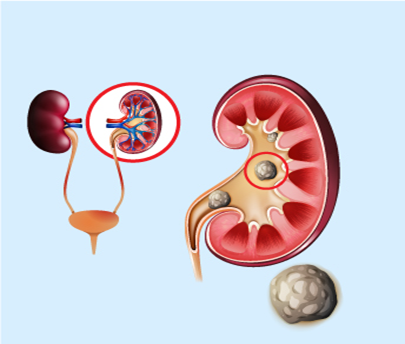A hard mineral deposit that forms in the kidneys, often leading to significant pain and discomfort. Understanding the causes, recognizing, and knowing treatment options can help to manage and prevent kidney stones effectively.
What Causes Kidney Stones?
When urine contains high levels of substances like calcium, oxalate, and uric acid, which crystallize and stick together to form stones. Factors that can increase your risk include:
- Dehydration: Not drinking enough fluids makes urine more concentrated, making it easier for stones to form.
- Diet: Consuming diet high in salt, sugar, and animal protein raises risk of developing kidney stones.
- Medical Conditions: Certain conditions, such as hyperparathyroidism and Crohn’s disease, can increase the likelihood of stone formation.
- Family History: A history of kidney stones in your family may make you more prone to developing them.
Symptoms to Watch For
Kidney stones cause a variety of symptoms, which may range from mild to severe. Common symptoms include:
- Severe Pain: Sharp pain in your back, side, or lower abdomen is a key sign of kidney stones. This pain may come and go and could be accompanied by nausea or vomiting.
- Blood in Urine: Kidney stones can cause blood to appear in your urine, making it pink or red.
- Difficulty Urinating: If a stone blocks your urine flow, it can cause pain and difficulty during urination.
- Fever and Chills: If an infection develops due to a kidney stone, you might experience fever and chills.
Treatment Options
The treatment depends on the size and severity of symptoms. Here are some common treatment approaches:
- Stay Hydrated: Drink more water to flush out tiny stones and prevent new ones from forming.
- Pain Relief: Over-the-counter pain relievers help to manage pain.
- Medications: Doctor might prescribe medications to help relax ureter, make it easier for the stone to pass.
- Shock Wave Therapy (ESWL): This non-invasive procedure uses shock waves to break up stones into smaller pieces that are easier to pass.
- Ureteroscopy: A minimally invasive procedure that involves using a small scope to remove stones from your ureter.
- Surgery: A surgical procedure called percutaneous nephrolithotomy is needed to remove large stones directly.
Preventing Kidney Stones
Preventing kidney stones is possible with a few lifestyle changes:
- Drink Plenty of Water
- Healthy Diet
- Medication
- Regular Check-Ups
By understanding kidney stones and taking proactive steps, you can manage symptoms and reduce the risk of future stones.



